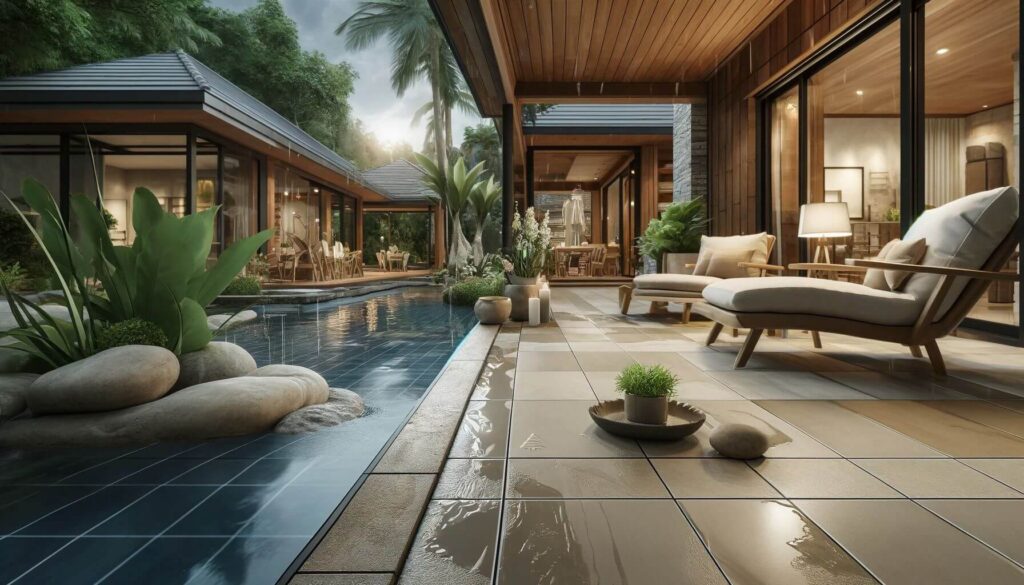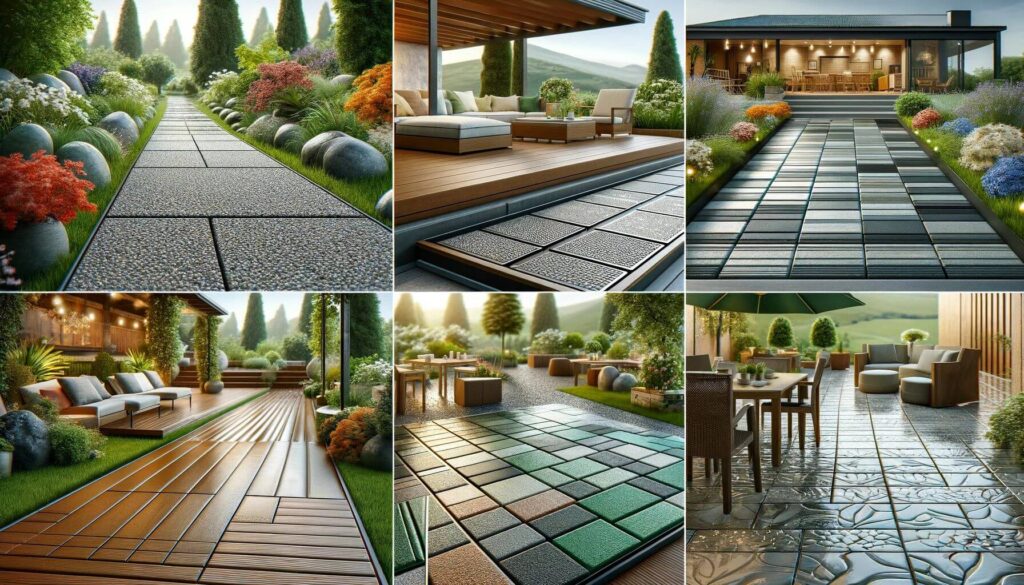
Choosing the flooring that is 100% waterproof is crucial for areas prone to moisture, such as kitchens, bathrooms, and basements. Waterproof flooring not only protects your home from water damage but also offers peace of mind. This article explores various types of flooring that are 100% waterproof and suitable for different spaces in your home.
Vinyl Flooring
Vinyl flooring is a popular choice for waterproof flooring. It’s available in various styles, including luxury vinyl planks (LVP) and luxury vinyl tiles (LVT), which mimic the look of hardwood and stone. Vinyl is made from synthetic materials, making it highly resistant to water and easy to clean.
Advantages of Vinyl Flooring:
- Waterproof: Perfect for bathrooms, kitchens, and basements.
- Durable: Can withstand heavy foot traffic.
- Easy to Maintain: Simple cleaning process with a mop and mild detergent.
- Cost-Effective: More affordable than other flooring options.
For more information on the advantages of vinyl flooring, visit Vinyl Flooring Advantages.
Porcelain and Ceramic Tiles

Porcelain and ceramic tiles are well-known for their water-resistant properties. They are commonly used in bathrooms and kitchens due to their durability and ease of maintenance. These tiles are made from dense clay, making them impervious to water.
Benefits of Porcelain and Ceramic Tiles:
- Waterproof: Ideal for areas exposed to water.
- Durable: Resistant to scratches and stains.
- Variety of Designs: Available in numerous colors and patterns.
- Low Maintenance: Easy to clean with regular sweeping and mopping.
Waterproof Laminate Flooring
Traditional laminate flooring is not waterproof, but advancements have led to the creation of waterproof laminate options. These laminates have a protective layer that prevents water from seeping into the core, making them suitable for kitchens and bathrooms.
Features of Waterproof Laminate Flooring:
- Water-Resistant Core: Prevents water damage.
- Realistic Appearance: Mimics the look of wood or stone.
- Easy Installation: Click-lock systems for DIY installation.
- Affordable: Less expensive than hardwood or stone.
Explore more about waterproof laminate flooring at Waterproof Laminate Flooring.
Waterproof Engineered Hardwood
Engineered hardwood flooring with a waterproof core is a relatively new innovation. It combines the beauty of natural wood with the durability of synthetic materials. This type of flooring is perfect for homeowners who want the aesthetic of hardwood without the risk of water damage.
Advantages of Waterproof Engineered Hardwood:
- Waterproof Core: Protects against spills and moisture.
- Authentic Wood Look: Real wood veneer on the surface.
- Durability: Resistant to warping and swelling.
- Easy to Clean: Simple maintenance with regular sweeping and mopping.
Stone Flooring
Natural stone flooring, such as granite, marble, and slate, is inherently water-resistant. These materials are ideal for both indoor and outdoor applications. Stone flooring is highly durable and can add a touch of elegance to any space.
Benefits of 100% Waterproof Stone Flooring:
- Water-Resistant: Suitable for wet areas.
- Long-Lasting: Extremely durable and can last a lifetime.
- Unique Appearance: Each stone tile is unique.
- Low Maintenance: Easy to clean and maintain.
For a deeper dive into stone flooring options, check out Stone Flooring Benefits.
Rubber Flooring

Rubber flooring is often used in gyms, playrooms, and laundry rooms. It is completely waterproof and provides a cushioned surface that is safe for children and adults. Rubber flooring is available in rolls and tiles, making it versatile for various applications.
Features of Rubber Flooring:
- Waterproof: Suitable for high-moisture areas.
- Shock Absorbent: Provides a cushioned surface.
- Durable: Resistant to wear and tear.
- Easy to Install: Available in rolls or interlocking tiles.
Cork Flooring
Cork flooring is an eco-friendly option that is also water-resistant. While not entirely waterproof, cork flooring has a natural resistance to water and mold, making it suitable for kitchens and bathrooms with proper sealing.
Benefits of Cork Flooring:
- Water-Resistant: With proper sealing, it can handle moisture.
- Eco-Friendly: Made from renewable resources.
- Comfortable: Soft underfoot and provides insulation.
- Hypoallergenic: Resistant to mold and mildew.
Concrete Flooring
Concrete flooring is another waterproof option, commonly used in basements and garages. When properly sealed, concrete is impervious to water and provides a durable, low-maintenance surface.
Advantages of Concrete Flooring:
- Waterproof: Ideal for basements and garages.
- Durable: Long-lasting and can withstand heavy loads.
- Customizable: Can be stained or painted for a unique look.
- Low Maintenance: Easy to clean and maintain.
For ideas on customizing your concrete flooring, visit Concrete Flooring Ideas.
100% Waterproof flooring FAQ

1. What is the best waterproof flooring for bathrooms?
Vinyl flooring and porcelain tiles are excellent choices for bathrooms due to their water resistance and durability.
2. Can laminate flooring be waterproof?
Yes, modern waterproof laminate flooring options have a protective layer that prevents water damage.
3. Is engineered hardwood flooring waterproof?
Waterproof engineered hardwood has a waterproof core, making it suitable for areas exposed to moisture.
4. How do I maintain waterproof vinyl flooring?
Regular sweeping and mopping with mild detergent will keep vinyl flooring clean and well-maintained.
5. Are all stone floors waterproof?
Natural stone floors like granite, marble, and slate are water-resistant, making them suitable for wet areas.
6. What makes rubber flooring a good choice?
Rubber flooring is completely waterproof, durable, and provides a cushioned surface, making it ideal for gyms and playrooms.
7. Can cork flooring be used in kitchens?
Yes, with proper sealing, cork flooring can handle the moisture typically found in kitchens.
8. Is concrete flooring a good option for basements?
Concrete flooring is waterproof and durable, making it an excellent choice for basements and garages.
9. How do I install waterproof laminate flooring?
Most waterproof laminate flooring features a click-lock system, making it easy for DIY installation.
10. What are the benefits of using porcelain tiles in kitchens?
Porcelain tiles are waterproof, durable, and available in various designs, making them ideal for kitchen flooring.
Choosing the right waterproof flooring ensures that your home remains protected from water damage while maintaining a stylish and functional space. For more information on flooring options and home improvement tips, visit the Home Improvement Interior Design section of our website.



